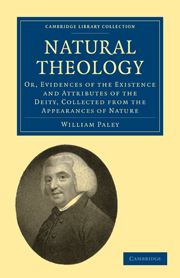 Natural Theology
Natural Theology Book contents
- Frontmatter
- Contents
- CHAP. I STATE OF THE ARGUMENT
- CHAP. II STATE OF THE ARGUMENT CONTINUED
- CHAP. III APPLICATION OF THE ARGUMENT
- CHAP. IV OF THE SUCCESSION OF PLANTS AND ANIMALS
- CHAP. V APPLICATION OF THE ARGUMENT CONTINUED
- CHAP. VI THE ARGUMENT CUMULATIVE
- CHAP. VII OF THE MECHANICAL AND IMMECHANICAL FUNCTIONS OF ANIMALS AND VEGETABLES
- CHAP. VIII OF MECHANICAL ARRANGEME'NT IN THE HUMAN FRAME—OF THE BONES
- CHAP. IX OF THE MUSCLES
- CHAP. X OF THE VESSELS OF ANIMAL BODIES
- CHAP. XI OF THE ANIMAL STRUCTURE REGARDED AS A MASS
- CHAP. XII COMPARATIVE ANATOMY
- CHAP. XIII PECULIAR ORGANIZATIONS
- CHAP. XIV PROSPECTIVE CONTRIVANCES
- CHAP. XV RELATIONS
- CHAP. XVI COMPENSATIONS
- CHAP. XVII THE RELATION OF ANIMATED BODIES TO INANIMATE NATURE
- CHAP. XVIII INSTINCTS
- CHAP. XIX OF INSECTS
- CHAP. XX OF PLANTS
- CHAP. XXI OF THE ELEMENTS
- CHAP. XXII ASTRONOMY
- CHAP. XXIII PERSONALITY OF THE DEITY
- CHAP. XXIV OF THE NATURAL ATTRIBUTES OF THE DEITY
- CHAP. XXV OF THE UNITY OF THE DEITY
- CHAP. XXVI THE GOODNESS OF THE DEITY
- CHAP. XXVII CONCLUSION
CHAP. XVIII - INSTINCTS
Published online by Cambridge University Press: 07 September 2010
- Frontmatter
- Contents
- CHAP. I STATE OF THE ARGUMENT
- CHAP. II STATE OF THE ARGUMENT CONTINUED
- CHAP. III APPLICATION OF THE ARGUMENT
- CHAP. IV OF THE SUCCESSION OF PLANTS AND ANIMALS
- CHAP. V APPLICATION OF THE ARGUMENT CONTINUED
- CHAP. VI THE ARGUMENT CUMULATIVE
- CHAP. VII OF THE MECHANICAL AND IMMECHANICAL FUNCTIONS OF ANIMALS AND VEGETABLES
- CHAP. VIII OF MECHANICAL ARRANGEME'NT IN THE HUMAN FRAME—OF THE BONES
- CHAP. IX OF THE MUSCLES
- CHAP. X OF THE VESSELS OF ANIMAL BODIES
- CHAP. XI OF THE ANIMAL STRUCTURE REGARDED AS A MASS
- CHAP. XII COMPARATIVE ANATOMY
- CHAP. XIII PECULIAR ORGANIZATIONS
- CHAP. XIV PROSPECTIVE CONTRIVANCES
- CHAP. XV RELATIONS
- CHAP. XVI COMPENSATIONS
- CHAP. XVII THE RELATION OF ANIMATED BODIES TO INANIMATE NATURE
- CHAP. XVIII INSTINCTS
- CHAP. XIX OF INSECTS
- CHAP. XX OF PLANTS
- CHAP. XXI OF THE ELEMENTS
- CHAP. XXII ASTRONOMY
- CHAP. XXIII PERSONALITY OF THE DEITY
- CHAP. XXIV OF THE NATURAL ATTRIBUTES OF THE DEITY
- CHAP. XXV OF THE UNITY OF THE DEITY
- CHAP. XXVI THE GOODNESS OF THE DEITY
- CHAP. XXVII CONCLUSION
Summary
The order may not be very obvious, by which I place inftincts next to relations. But I confider them as a fpecies of relation. They contribute, along with the animal organization, to a joint effect, in which view they are related to that organization. In many cafes they refer from one animal to another animal; and, when this is the cafe, become ftrictly relations in a fecond point of view.
An INSTINCT is a propenfity, prior to experience, and independent of inftruction. We contend, that it is by inftinct that the fexes of animals feek each other; that animals cherifh their offspring; that the young quadruped is directed to the teat of its dam; that birds build their nefts, and brood with fo much patience upon their eggs; that infects, which do not fit upon their eggs, depofit them in thofe particular fituations, in which the young, when hatched, find their appropriate food; that it is inftinct, which carries the falmon, and fome other fifh, out of the fea into rivers, for the purpofe of fhedding their fpawn in frefh water.
We may felect: out of this catalogue the incubation of eggs. I entertain no doubt, but that a couple of fparrows hatched in an oven, and kept feparate from the reft of their fpecies would proceed as other fparrows do, in every office which related to the production and prefervation of their brood.
- Type
- Chapter
- Information
- Natural TheologyOr, Evidences of the Existence and Attributes of the Deity, Collected from the Appearances of Nature, pp. 324 - 345Publisher: Cambridge University PressPrint publication year: 2009First published in: 1803


